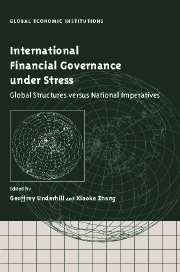Book contents
- Frontmatter
- Contents
- List of figures
- List of tables
- List of contributors
- Acknowledgements
- Introduction: global market integration, financial crises and policy imperatives
- I Financial globalisation and policy responses: concepts and arguments
- II Globalisation, financial crises and national experiences
- III Private interests, private–public interactions and financial policy
- IV Building the new financial architecture: norms, institutions and governance
- 15 The legitimacy of international organisations and the future of global governance
- 16 The G-7 and architecture debates: norms, authority and global financial governance
- 17 Bail-outs, bail-ins, and bankruptcy: evolution of the new architecture
- Conclusion: towards the good governance of the international financial system
- Index
16 - The G-7 and architecture debates: norms, authority and global financial governance
Published online by Cambridge University Press: 22 September 2009
- Frontmatter
- Contents
- List of figures
- List of tables
- List of contributors
- Acknowledgements
- Introduction: global market integration, financial crises and policy imperatives
- I Financial globalisation and policy responses: concepts and arguments
- II Globalisation, financial crises and national experiences
- III Private interests, private–public interactions and financial policy
- IV Building the new financial architecture: norms, institutions and governance
- 15 The legitimacy of international organisations and the future of global governance
- 16 The G-7 and architecture debates: norms, authority and global financial governance
- 17 Bail-outs, bail-ins, and bankruptcy: evolution of the new architecture
- Conclusion: towards the good governance of the international financial system
- Index
Summary
Since the 1980s, a regular round of meetings between finance ministers and central bank governors from the G-7 countries has been one of the principal mechanisms for formulating international financial and monetary policy. This chapter traces the contribution of the G-7 finance ministers and central bank governors to debates on the design of the international financial system, and draws conclusions on the collective role these agencies play in global financial governance. Such an exercise takes us right to the very heart of questions concerning the exercise of power and authority in the international system. Over the last decade, G-7 finance ministries and central banks have shared and refined ideas and drawn collective lessons against a backdrop of widespread financial turmoil that has posed questions about the sustainability of the current system and the authority of the state.
It is argued in this chapter that the G-7 finance ministries and central banks have developed a narrow, technical belief system. This belief system has not only constrained the finance ministries' and central banks' ability to respond to financial crises, but it has also generated a series of very modest incremental proposals for reform of the global financial system. Rather than challenging the finance ministries' and central banks' belief system, the principal impact of the financial crises of 1997–8 and the subsequent response has been to reinforce, refine, deepen and extend the belief system into new countries and new policy areas. The likely net result of these activities is further capital account liberalisation.
- Type
- Chapter
- Information
- International Financial Governance under StressGlobal Structures versus National Imperatives, pp. 324 - 342Publisher: Cambridge University PressPrint publication year: 2003



